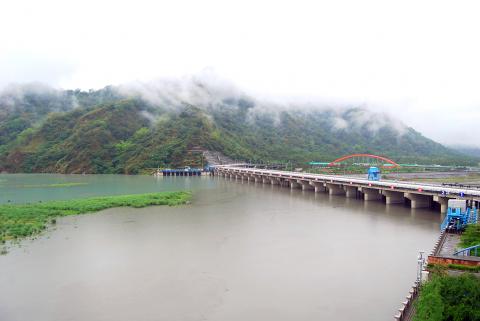The threat of water shortages in the country is “thousands of times more serious” than that of radiation leaks or toxic waste from petrochemical plants, Public Construction Commission (PCC) Chairman Lee Hong-yuan (李鴻源) said yesterday.
Water resource management in Taiwan is poor because the government focuses on building more reservoirs as a short-term option instead of addressing a sustainable and balanced development plan for renewable resources, Lee told a seminar on water control held by the Yu Chi-Chung Cultural and Educational Foundation.
The foundation said more than 75 percent of Taiwan’s annual collected rainfall of 90 billion tonnes evaporates in storage or is lost in the supply process.

Photo: Chen Hsin-jen, Taipei Times
Lee said the water shortage problems can largely be attributed to increasing reservoir sedimentation, poorly maintained pipelines and careless usage by consumers, who have long enjoyed very low water costs.
A 2004 survey by the Taiwan Water Corp found the average water rate in Taiwan was NT$10.72 per cubic meter, compared with NT$65 in Japan and NT$19.3 in the US.
Lee said there needed to be more coordination among the Water Resources Agency, the Council of Agriculture and the Construction and Planning Agency to allocate water management budgets more efficiently as well as set a reasonable price for water.
Lack of rain earlier this year has led to water restrictions in several areas. A plan to impose a second stage of water rationing in select areas at the end of this month was postponed on Monday in the wake of heavy rains in the past week.
The Ministry of Economic Affairs said it would wait to see how much more rain falls this week before deciding whether to impose further water rationing next month. Southern Taiwan, which has collected 17 million cubic meters of water since last Friday, will still faces shortages during the peak June-to-November rice planting season if it does not receive more rain, the ministry said.
Noting the recent protests by environmentalists against Taiwan’s nuclear power and petrochemical industries, Lee said similar action needs to be taken to push the government to tackle the water issue.
“We can’t expect the rain to fall every time we find ourselves short of water, “ Lee said. “We need a policy that has vision.”

A strong continental cold air mass is to bring pollutants to Taiwan from tomorrow, the Ministry of Environment said today, as it issued an “orange” air quality alert for most of the country. All of Taiwan except for Hualien and Taitung counties is to be under an “orange” air quality alert tomorrow, indicating air quality that is unhealthy for sensitive groups. In China, areas from Shandong to Shanghai have been enveloped in haze since Saturday, the ministry said in a news release. Yesterday, hourly concentrations of PM2.5 in these areas ranged from 65 to 160 micrograms per cubic meter (mg/m³), and pollutants were

Taiwan’s armed forces have established response protocols for a wide range of sudden contingencies, including the “Wan Chun Plan” to protect the head of state, the Ministry of Defense (MND) said today. After US President Donald Trump on Saturday launched a series of airstrikes in Venezuela and kidnapped Venezuelan President Nicolas Maduro, concerns have been raised as to whether China would launch a similar “decapitation strike” on Taiwan. The armed forces regularly coordinate with relevant agencies and practice drills to ensure preparedness for a wide range of scenarios, Vice Minister of National Defense Hsu Szu-chien (徐斯儉) told reporters before a

EVA Airways on Saturday said that it had suspended a pilot and opened an investigation after he allegedly lost his temper and punched the first officer several times as their plane was taxiing before takeoff at Los Angeles International Airport. According to a report published on Thursday by The Reporter, the incident occurred after the flight’s Malaysian first officer tried to warn the Taiwanese pilot, surnamed Wen (文), that he was taxiing faster than the speed limit of 30 knots (55.6kph). After alerting the pilot several times without response, the first officer manually applied the brakes in accordance with standard operating

Japanese Councilor Hei Seki (石平) on Wednesday said that he plans to visit Taiwan, saying that would “prove that Taiwan is an independent country and does not belong to China.” Seki, a member of the Japan Innovation Party, was born in Chengdu in China’s Sichuan Province and became a naturalized Japanese in 2007. He was elected to the House of Concilors last year. His views on the Chinese Communist Party (CCP) — espoused in a series of books on politics and history — prompted Beijing to sanction him, including barring Seki from traveling to China. Seki wrote on X that he intends